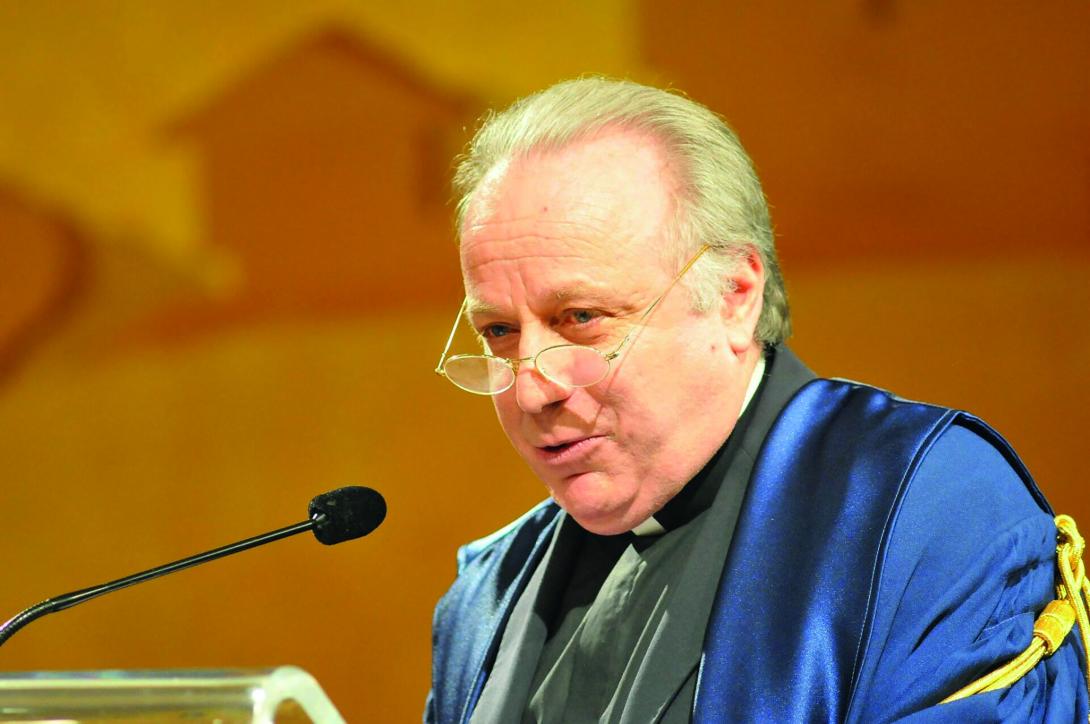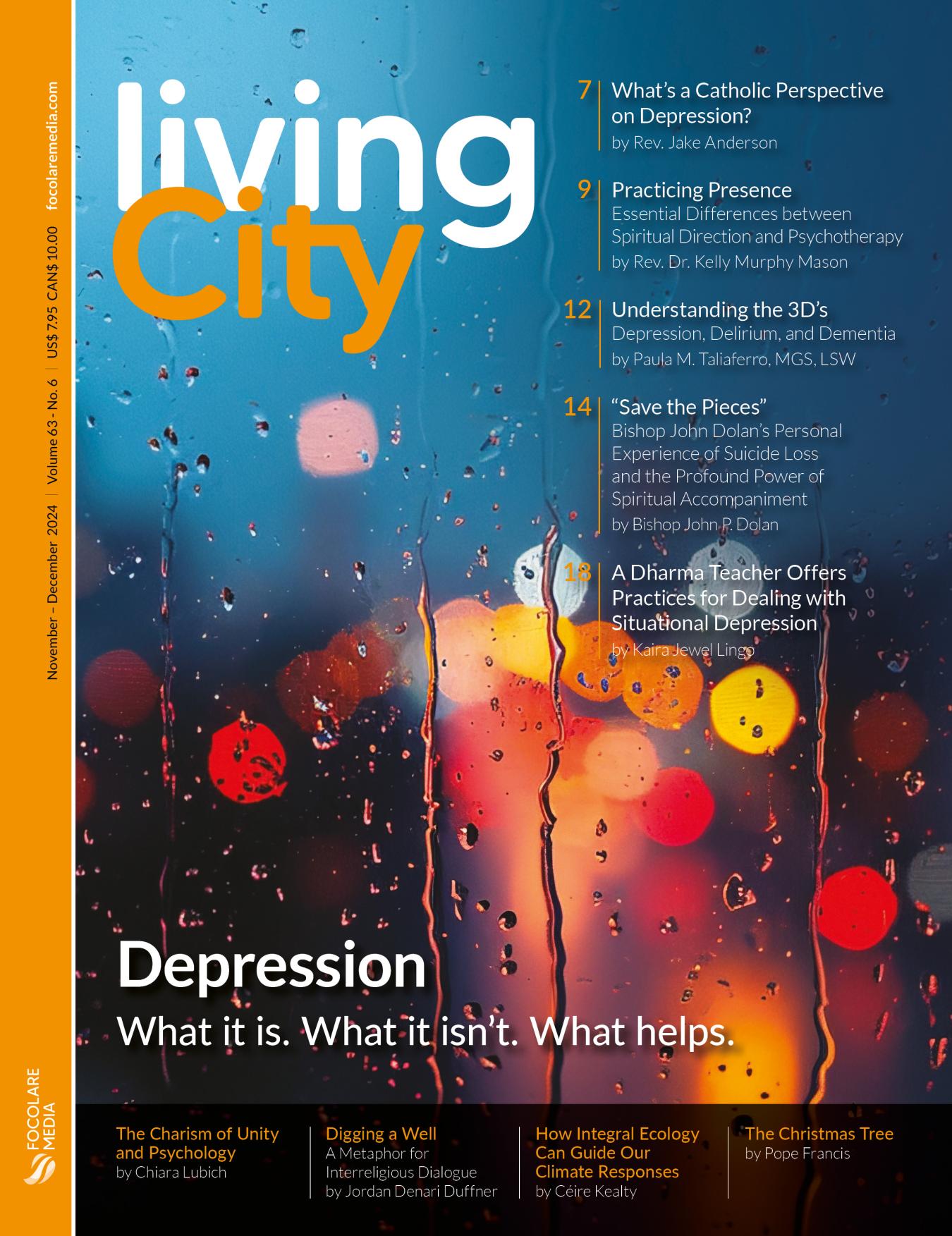Piero Coda participates in the different stages of work in the synodal process as a member of the Synod’s Theological Commission. He offered a panoramic view of what the Church is living right now, emphasizing what is new and important in today’s Synod on Synodality

©Photo by focolare.org
I am participating in the synodal process where the Catholic Church is engaged today in an intense, unforeseen way. I was called to be part of the theological commission from the start; it has the task of accompanying the ongoing development. And I have recognized more and more that this is a really special experience. I am sincerely grateful to God for this. It allows me to perceive up close the discreet, strong breath of the Holy Spirit in action in the Church.
This is in the Church today—certainly with all the challenges we know and the existing problems. But the Holy Spirit is pushing and helping us—as Klaus Hemmerle said—to see everything, “with the eyes of Easter,” which make us grasp the announcement of the resurrection and of new paths, in the trials and crosses. The Risen Lord is the one guiding the Church in the light and strength of the Holy Spirit, making it journey and grow so that it is able to offer a witness of the Gospel of the Kingdom at a par with the signs of the times, attentive to what the Holy Spirit says to it. In this way it can respond to the truest, deepest expectations and desires of the men and women of our time.
It is essential to be in tune with the Second Vatican Council to discern the meaning of what is happening with these eyes. That council was not only the most important event in the Church’s life last century, but one of the most important events in the whole history of Christianity because it was the prophetic announcement of the Church of the third millennium.
In fact, the Church is not a reality which was already defined once and for all, which was then dropped into history. It is the journey of God’s people guided by the Holy Spirit along the paths of history around the risen Jesus under the Father’s look of love. This is to fertilize the seed of the Gospel with a style and form of life which are always new, although they are certainly those of all times, those of Jesus, since they are rooted in him who “is the same yesterday, today and forever.”
This is because God always does new things for his children. Isn’t he himself saying to us today, “I am doing a new thing! Now it springs up; do you not perceive it?”
Yes, what is new about Jesus is… always new! The theologian, Karl Rahner said that the Second Vatican Council was the beginning of a new beginning, in other words the beginning of a new epoch in the Church’s history, requiring time to be deciphered and implemented in its expressions. The Risen Lord is the one guiding the Church in the light and strength of the Holy Spirit
For the bishops that participated, the experience of the Council was a new experience of being Church. Pope John XXIII talked about it like a new Pentecost. Pope Paul VI instituted the Synod of Bishops at the end of the Council in 1965 so that this experience could continue and bear fruit in the entire People of God, and so that the Pope’s ministry of unity would be lived in communion with all the bishops according to the principle of collegiality.
It is important and new for the Catholic Church which has journeyed all these years; it rejuvenated the Church’s face in many respects while it experienced new forms of life and mission at the same time in different cultural and social contexts, including the blossoming of lay associations and ecclesial movements.
On the basis of the journey to this point, drawing in particular from the treasure of the Church’s experience in Latin America from where he comes, Pope Francis felt the need to take a step forward after fifty years to give momentum to the new epoch of the announcement of the Gospel that we are called to live. Latin America may actually be the continent where the Second Vatican Council most deeply fermented the Church’s journey.
We know that Europe, instead, was long divided because of the cold war: it was difficult to be able to freely express the Church’s mission in the East, on one hand, since it was only possible to bear witness to interior, mystical power; the strong impulse of secularism in the West, on the other hand, ended the model of Christianity which had also given birth to positive examples, but ended up with a defensive posture prevailing in the Church, more than a proactive one.
In the memorable speech in 2015 for the fiftieth anniversary of the Bishops’ Synod, Pope Francis extended an invitation to take a step ahead beginning with the teaching of Vatican II and taking into consideration the journey to this point.
All the bishops in communion with the Pope are called to exercise an effective co-responsibility for the entire Church’s mission according to this principle. He stressed another fundamentally important thing together with this—that this co-responsibility is achieved beginning with service to the communion lived in each of the churches for which they are bishops.
In chapter 1 of Lumen Gentium, Vatican II’s document on the Church, God’s plan of love on humanity is described; it is achieved through the Church as “a sign and instrument [in Christ] both of a very closely knit union with God and of the unity of the whole human race.” There is reference in the second chapter to the People of God, made up of all the baptized with their different vocations, charisms, and ministries. That is why they are engaged in the Church’s one and only mission, all having the same dignity as children of God for this.
In fact, the presence and action of the risen Jesus and the Holy Spirit was experienced according to the promise recorded in the Gospel “Where two or more are gathered in my name, there I am in their midst.”
The bishops’ collegial ministry at the service of the growth and mission of the People of God in communion among all the local churches in the one and only universal Church is the theme of the third chapter. By summoning the synodal process, Pope Francis stresses that the Bishops’ Synod is put at the service of the journey of the entire People of God, beginning with the local churches, with everyone’s participation in the Church’s life and mission.
Upon the Pope’s invitation, the International Theological Commission (to which I belong), published a document in 2018 to study this topic. Pope Francis reformed the Bishops’ Synod in the same year with the apostolic constitution, Episcopalis Communio. There he emphasized that the Bishops’ Synod, a precious, strategic legacy of Vatican II, must be the beating heart of a process to promote everyone’s participation in all the local churches, to converge in the Bishops’ Synod in unity with the Pope. And from here they return and give inspiration and momentum to the journeys of the local churches.
The synods on the family and on youth already began to put this dynamic into practice. The synod was thereby experienced not only as a timely event, but a process involving the entire People of God; everyone is called to participate in this process. The bishops then are responsible for carrying out the discernment which is their task in virtue of their ministry, and the Pope has the final word, putting a seal on the process. But the entire People of God is called to offer its indispensable, particular contribution, in the variety of its charisms and the diversity and wealth of experiences which it bears
After the synod on youth, the synod’s bishops proposed three different topics for the next one; among these was the study of what it means to become an increasingly synodal Church, by being faithful to the Gospel and to the Church’s tradition, bringing about a new missionary thrust in our time. This was the precise topic which the Pope chose in 2021, putting in motion the process which we are living. The topic was formulated in these terms: “For a Synodal Church: Communion, Participation, and Mission.” It is not a matter of dealing with particular problems which are on the table, and which are big ones in the Church today. It is a matter of reflecting together about what it means to be a synodal Church where we all learn to live communion and mission, each one sharing in it with creativity and responsibility according to their vocation.
This occurs in three stages. The first is in the local churches, not only the single dioceses, but the churches on a national and continental level as well. The second will be with the assembly of the Bishops’ Synod to be celebrated in October this year in a first session, and then in a second one next year, 2024. Seventy lay people will participate in it for the first time as full members—women and men. The third stage will finally occur with reporting the outcome of the Bishop’s Synod to the local churches so that each one can discern what it means concretely to be a synodal church, what initiatives must be undertaken, and the priority of the problems to be confronted.
A summary document was put together, the instrumentum laboris, to prepare the assembly of the synod in the Fall. It contains the results of the first stage of the journey. This first stage was implemented with different levels of intensity and commitment in various dioceses because a lot depended on the single bishops in the dioceses and the single priests in the parishes in launching and carrying out the process. The commitment in this implementation also varied because only a minority of the People of God was sensitized and participated. But hope was greatly awakened where the process was launched and pursued. In fact, the presence and action of the risen Jesus and the Holy Spirit was experienced according to the promise recorded in the Gospel “Where two or more are gathered in my name, there I am in their midst.”
This is the main point! The Secretary General of the Synod, Cardinal Mario Grech, clearly expressed it recently when he said, “I realize more and more that the synodal process is a spiritual fact. The Pope always says it: ‘The protagonist is the Holy Spirit.’”
The synodal process is really a golden opportunity to learn and listen to the Holy Spirit together, and to put in common the gifts each one has received to discern where the Holy Spirit is guiding us as the Church that is “going out.” Our respective experiences and our specific expertise must be treasured, but it is also necessary to be ready to listen to everyone, to not be attached to our viewpoints. In this way it will be possible to discern not so much what we are thinking, but what the Holy Spirit is saying. This style and method are called “spiritual conversation.” It means getting together not to talk about our viewpoints, but to listen to God’s Word together, to let ourselves be guided by the Holy Spirit’s inspiration. On this basis, we can say in the end with humility and trust, “It seemed good to the Holy Spirit and to us,” as it is written in the Acts of the Apostles.
Translated from the Italian
by William Neu













